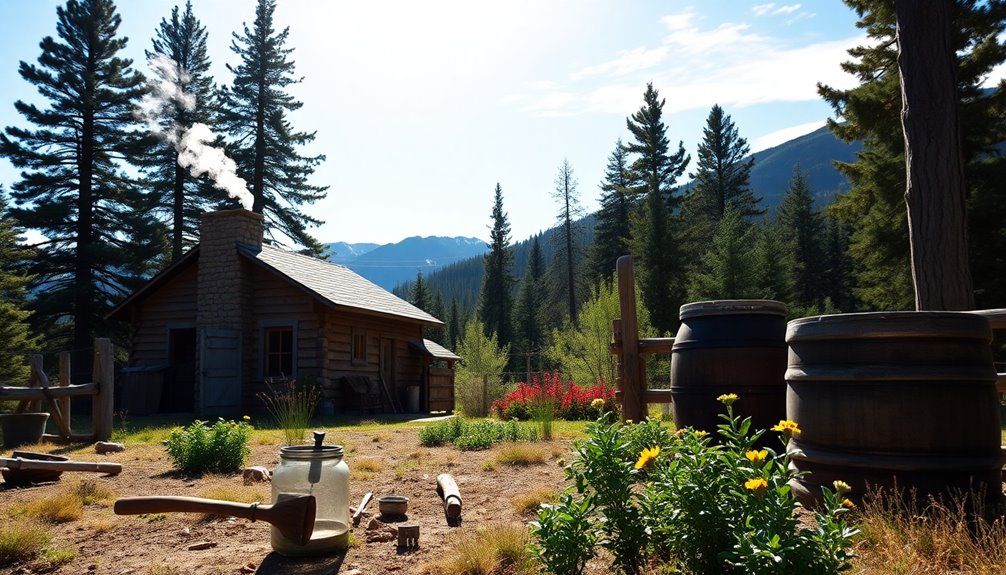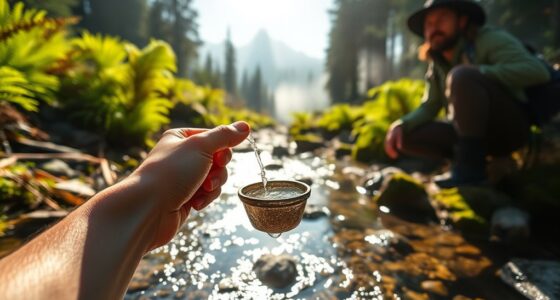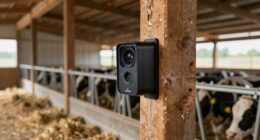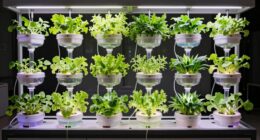To thrive off the grid, you'll need practical skills and a good understanding of resource management. Start by mastering water management—harvest rainwater and use effective filtration methods. Grow your own food with sustainable gardening techniques like companion planting. Preserve what you harvest through canning or dehydrating. Consider renewable energy sources, such as solar panels, to reduce your reliance on external power. Additionally, prepare for emergencies by developing comprehensive plans and basic survival skills. There's so much more to explore that will help you live sustainably and successfully in an off-grid world.
Key Takeaways
- Implement effective water management techniques, such as rainwater harvesting and filtration, to ensure a sustainable water supply without modern plumbing.
- Grow your own food using sustainable gardening practices like permaculture and companion planting to maintain a year-round food supply.
- Preserve food through methods like canning, dehydrating, and fermenting to extend shelf life and minimize waste.
- Utilize renewable energy sources, such as solar panels and wind turbines, to generate power and reduce dependence on fossil fuels.
- Develop emergency preparedness plans and build a support network to enhance resilience during crises and resource scarcity.
Introduction
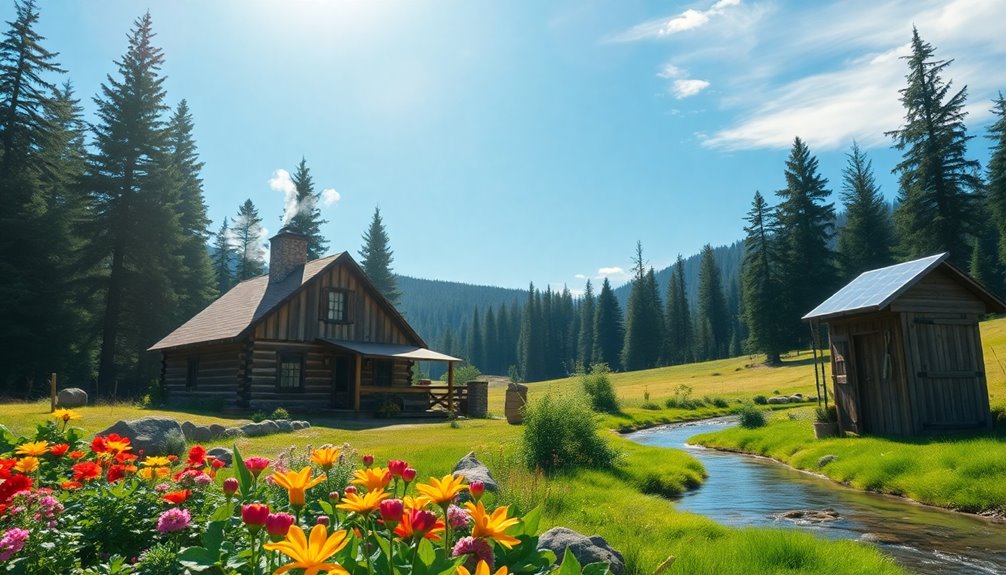
When you choose off-grid living, you embrace a lifestyle that hinges on self-reliance and essential skills.
You'll need to master survival techniques like water management and food production to thrive without modern conveniences.
Essential Off-Grid Living Skills
In off-grid living, mastering essential skills is crucial for thriving in a self-sufficient environment.
You'll need to develop water management techniques, including rainwater harvesting and filtration, to secure a reliable water supply.
Cultivating sustainable gardens is vital—growing your own food using companion planting and crop rotation boosts production and enriches soil health.
Embracing renewable energy sources, like solar panels and wind turbines, lessens your dependence on traditional power grids. Additionally, utilizing solar-powered irrigation systems can enhance crop yields and efficiency.
Learning food preservation methods such as canning, dehydrating, and fermenting helps extend the shelf life of your harvests and reduces waste.
Lastly, building and maintaining fortified shelters not only ensures safety but also enhances energy efficiency and temperature regulation.
These skills form the backbone of successful off-grid living.
Survival Skills for Self-Reliance
Building a solid foundation of survival skills is key to achieving self-reliance in an off-grid lifestyle. Mastering essential skills like shelter construction protects you from the elements, while renewable energy generation techniques, such as solar and wind power, boost your self-sufficiency.
Cultivating sustainable gardens not only provides fresh food but also deepens your connection to the land. Effective water management, including rainwater harvesting and filtration, ensures a clean and reliable source.
One crucial aspect of self-reliance is food preservation. By developing methods like canning and dehydrating, you can extend the shelf life of your harvests, guaranteeing a stable food supply throughout the year. Additionally, understanding the environmental impacts of wood-burning can help you make informed decisions about your energy sources and reduce your ecological footprint.
These skills empower you to thrive independently, embracing a fulfilling off-grid existence.
Key Concepts of Off-Grid Living
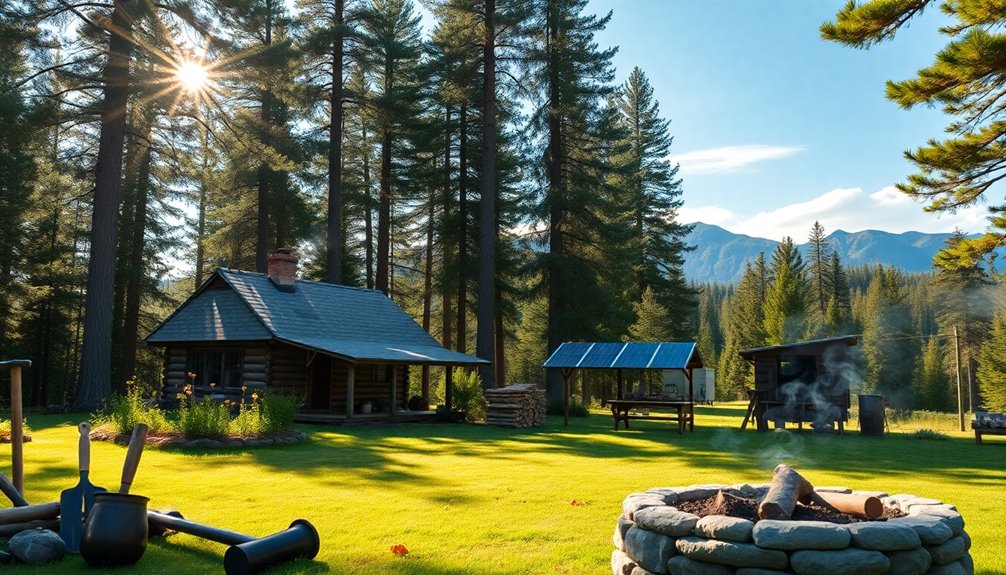
Off-grid living often revolves around self-sufficiency, where you harness renewable resources like solar power and wind energy to break free from traditional utility services.
By adopting sustainable practices, you can create a self-reliant lifestyle. Implement organic gardening and aquaponics to ensure a consistent supply of fresh food year-round.
Effective waste management techniques, such as composting and greywater recycling, promote environmental sustainability and conserve resources.
Building a fortified shelter from eco-friendly materials enhances energy efficiency, reducing your need for additional heating and cooling.
Lastly, mastering basic survival skills—like first aid and food preservation—is essential for thriving off-grid, ensuring you're prepared for any challenges that come your way. Additionally, understanding water efficiency through rainwater harvesting systems can significantly contribute to your off-grid resource management.
Embrace these key concepts to fully enjoy an off-grid lifestyle.
Essential for Emergency Preparedness
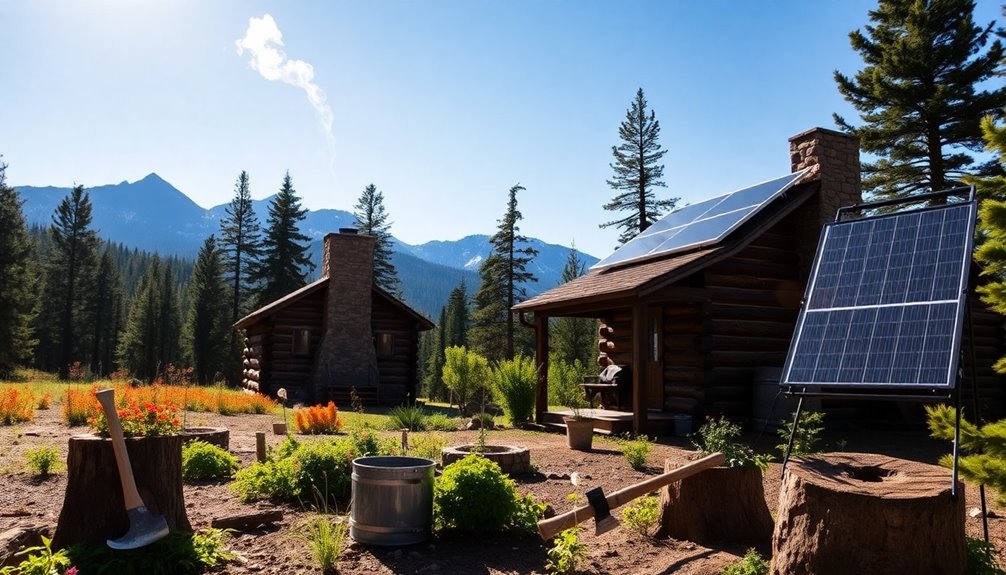
Emergency preparedness is all about equipping yourself for unexpected situations, ensuring you can handle whatever comes your way.
You need to develop specific strategies tailored to different disasters, so you're ready for anything from floods to power outages.
Crisis Readiness and Resilience
How prepared are you for a crisis? Developing crisis readiness is key to thriving during emergencies, whether they're economic downturns or natural disasters.
Start by cultivating a self-sufficient mindset and mastering practical skills. A comprehensive emergency plan that includes food, water, and shelter resources is crucial for maintaining resilience when challenges arise.
Understanding the importance of emergency preparedness can significantly reduce anxiety and enhance your response times, leading to better outcomes. Additionally, training in basic first aid and medical skills equips you to handle health emergencies when professional help isn't available.
Finally, establish a network of support with like-minded individuals; sharing resources and knowledge strengthens your resilience and ensures you're not facing crises alone. To further bolster your readiness, consider investing in essential survival gear that can greatly enhance your preparedness for various scenarios.
Disaster-Specific Preparedness Strategies
Preparing for specific disasters is a vital component of your overall emergency preparedness strategy. Start by developing a comprehensive emergency plan that details communication protocols, evacuation routes, and a designated meeting location for your family.
Assemble a well-stocked emergency kit with at least a two-week supply of food, water, first aid supplies, and essential documents. Focus on food preservation techniques, like canning or dehydrating, to ensure your supplies last longer.
Learn basic survival skills, such as shelter construction and water purification, to boost your self-sufficiency. Stay informed about local hazards and tailor your strategies accordingly.
Lastly, regularly conduct emergency drills with your family to ensure everyone understands their roles, enhancing your overall readiness and response time during a disaster.
DIY Water Filtration Methods
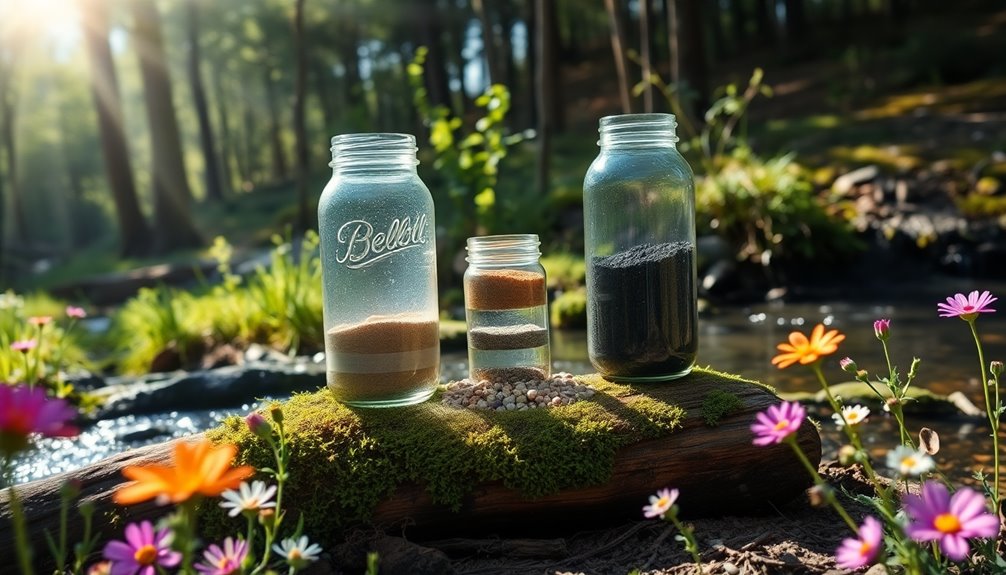
Clean water is essential for survival, and crafting your own DIY water filtration system can ensure you have access to safe drinking water.
One effective method involves layering gravel, sand, and activated charcoal in a container. This setup removes impurities and enhances taste. You can also boil water for at least one minute to kill harmful microorganisms, ensuring safety.
For rainwater, using a first-flush diverter to filter out initial contaminants, followed by a sand and gravel filter, can provide further purification. Additionally, a solar still can distill water by utilizing sunlight, perfect for areas with limited fresh water. Always remember to store oils properly to maintain their potency when using essential oils for purification purposes.
Essential Off-Grid Equipment
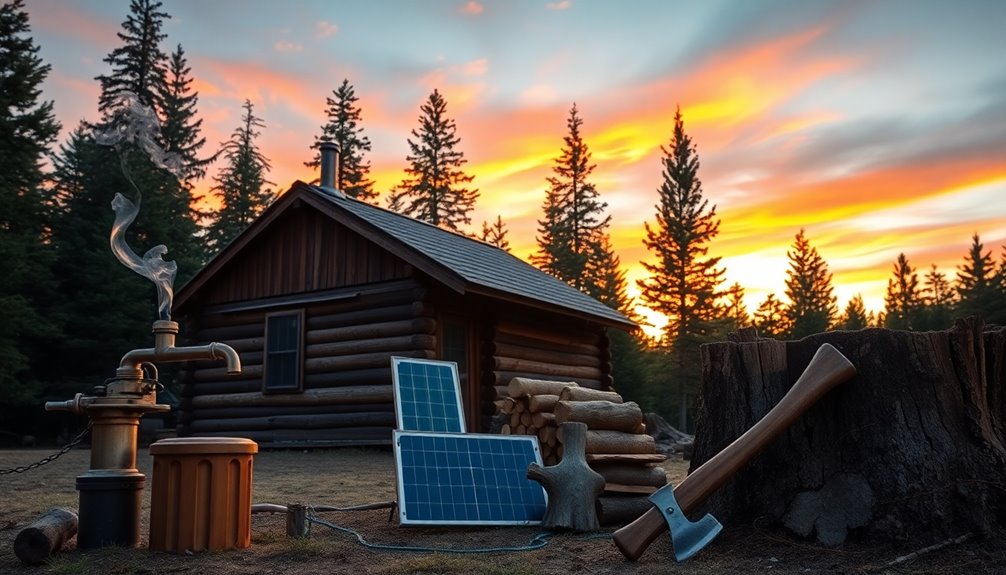
When you're living off the grid, having the right equipment is crucial for maintaining a sustainable and functional lifestyle.
Start with solar panels, capable of generating around 300 watts each, which can significantly cut down your reliance on traditional power sources.
A reliable water filtration system is essential for clean drinking water, with gravity-fed filters that remove 99.99% of harmful bacteria.
Don't forget hand-powered tools like manual saws and drills, which are vital for construction and maintenance without electricity.
A portable solar generator offers backup power for charging devices and small appliances.
Finally, consider composting toilets, which reduce water usage by up to 90% and promote eco-friendly waste management—key elements of essential off-grid equipment.
Sustainable Resource Management Techniques
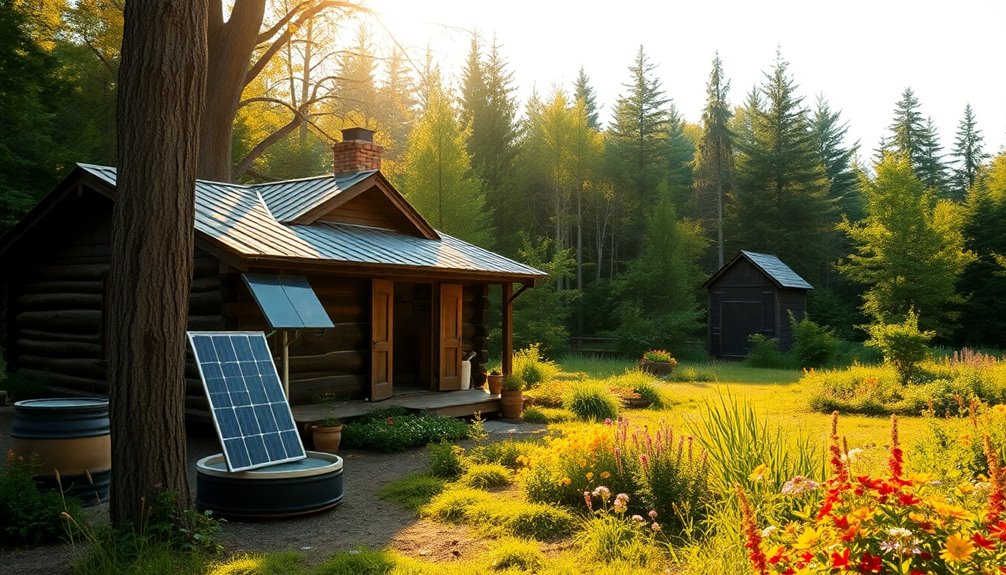
Living off the grid means finding ways to make the most of your resources while minimizing waste. Implementing sustainable resource management techniques is crucial.
Start with rainwater harvesting; a 1,000 square foot roof can capture up to 1,200 gallons with just one inch of rain.
Consider greywater recycling systems to reuse water from sinks and showers, saving up to 50% of your freshwater consumption.
Adopting permaculture principles in your garden can boost crop yields by 20-50% and enhance soil health.
Additionally, using biochar improves soil fertility while sequestering carbon.
Lastly, transitioning to renewable energy sources like solar and wind can cut reliance on fossil fuels by 80%, promoting energy independence and reducing your carbon footprint.
Resource Scarcity Management
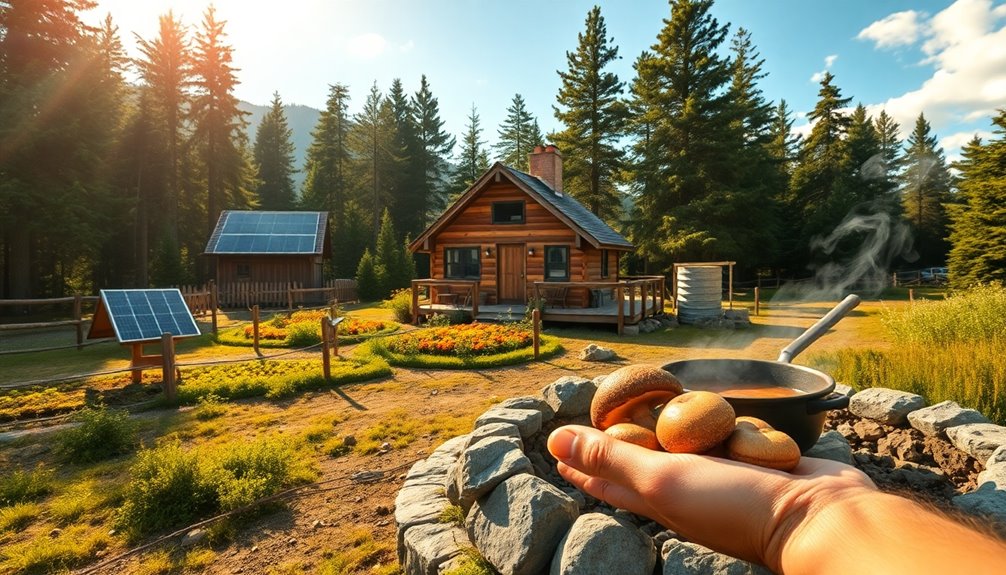
When managing resource scarcity, building community support networks can be a game changer, as sharing resources and knowledge strengthens resilience. Effective waste management techniques also play a crucial role, helping you repurpose materials and minimize waste. Additionally, understanding local laws can significantly influence the effectiveness of your preparedness strategies.
Community Support Networks
In off-grid living, community support networks can make a significant difference in managing resource scarcity. By collaborating with others, you can share tools, knowledge, and supplies, enhancing your resilience.
These networks often facilitate bartering systems, allowing you to exchange goods and services without relying on currency, especially useful during economic downturns. Establishing local alliances improves access to vital resources like water, food, and medical supplies, as everyone pools their assets and skills to tackle common challenges.
Participating in workshops and training sessions also boosts your survival skills, from food preservation to renewable energy solutions. Strong community support networks increase your chances of recovering from disasters and maintaining sustainable practices, proving essential for long-term off-grid success.
Effective Waste Management Techniques
Effective waste management techniques are crucial for off-grid living, especially in resource-scarce environments.
Start by implementing a composting system to transform organic waste into nutrient-rich soil, significantly reducing landfill contributions.
Establish a waste segregation routine to manage recyclables, compostables, and non-recyclable items responsibly.
Consider greywater recycling techniques to reuse water from sinks and showers for irrigation, cutting down on overall water consumption.
Setting up a bioreactor for anaerobic digestion can convert food scraps into biogas, providing a renewable energy source for cooking or heating.
Finally, practice minimalism and mindful consumption, focusing on durable goods and the art of food preservation to further decrease waste generation. Additionally, ensure that you are aware of air quality considerations as they can significantly impact your overall health and well-being in an off-grid environment.
Successful Off-Grid Homesteaders
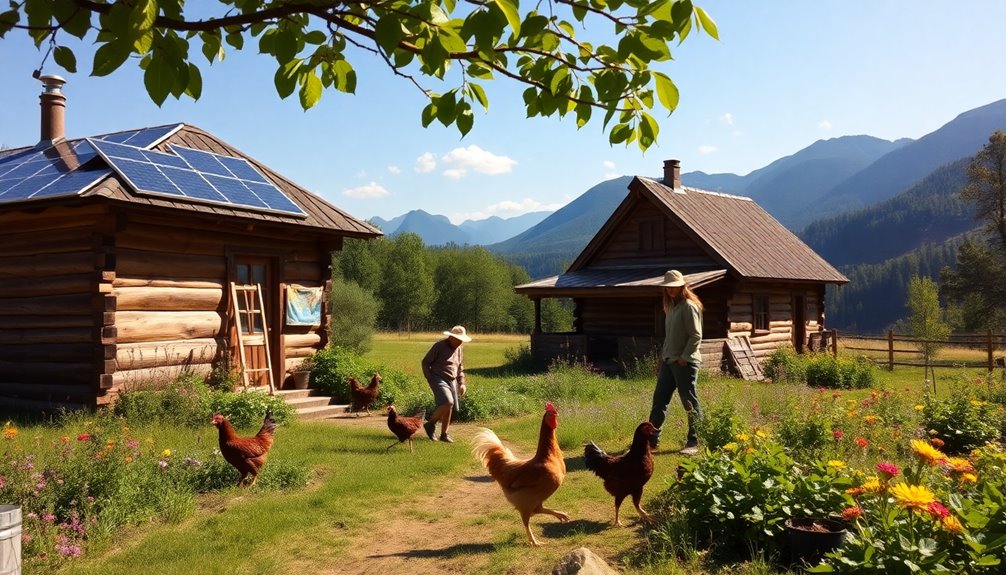
Successful off-grid homesteaders share common traits that set them apart from traditional homeowners. They prioritize building energy-efficient, eco-friendly shelters using reclaimed materials, reducing their environmental impact.
Many rely on renewable energy sources like solar panels, which can provide up to 80% of their energy needs. Heat pumps can also enhance energy efficiency and reduce dependence on fossil fuels, making them an attractive option for off-grid living.
When it comes to food, successful homesteaders develop sustainable gardens, employing organic practices and permaculture principles to grow a variety of fruits and vegetables year-round.
They often integrate livestock, with chickens for eggs and pest control, and goats for milk and land management.
Additionally, community networking is vital; sharing resources and knowledge through local groups and online platforms fosters cooperation and support, further enhancing their off-grid lifestyle.
Conclusion
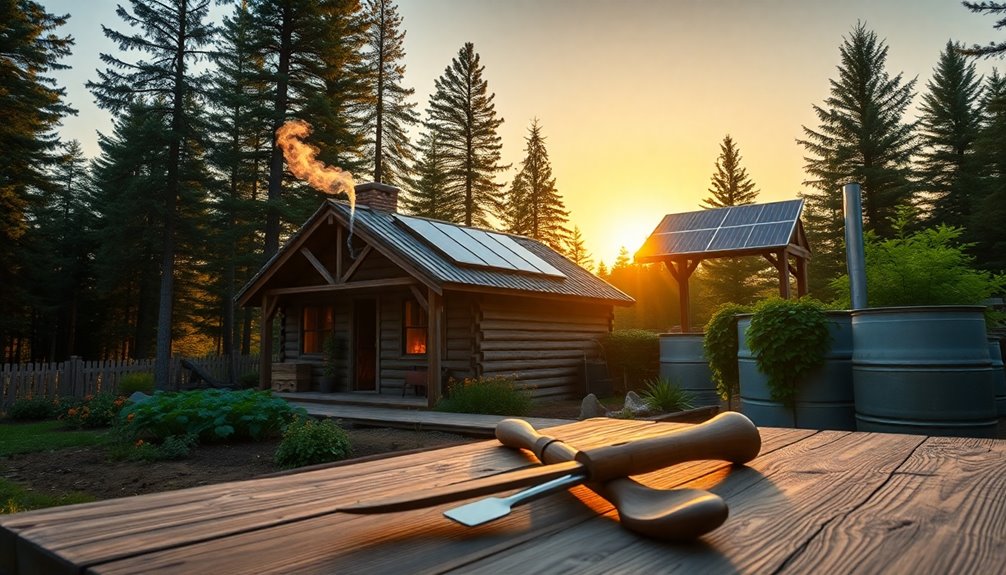
Although embarking on an off-grid lifestyle may seem daunting, the rewards of self-sufficiency and sustainability make it worthwhile.
By honing practical skills and managing resources effectively, you can create a thriving environment without modern utilities. Establishing renewable energy sources like solar or wind power is essential, reducing reliance on traditional grids.
Equally important is developing a reliable water supply through techniques such as rainwater harvesting and filtration systems. Successful food production through organic gardening and smart preservation methods ensures you stay nourished.
Additionally, being proactive about security, hygiene, and emergency medical training enhances your resilience. Embracing off-grid living not only fosters independence but also connects you with nature, ultimately leading to a fulfilling and sustainable life.
Additional Resources
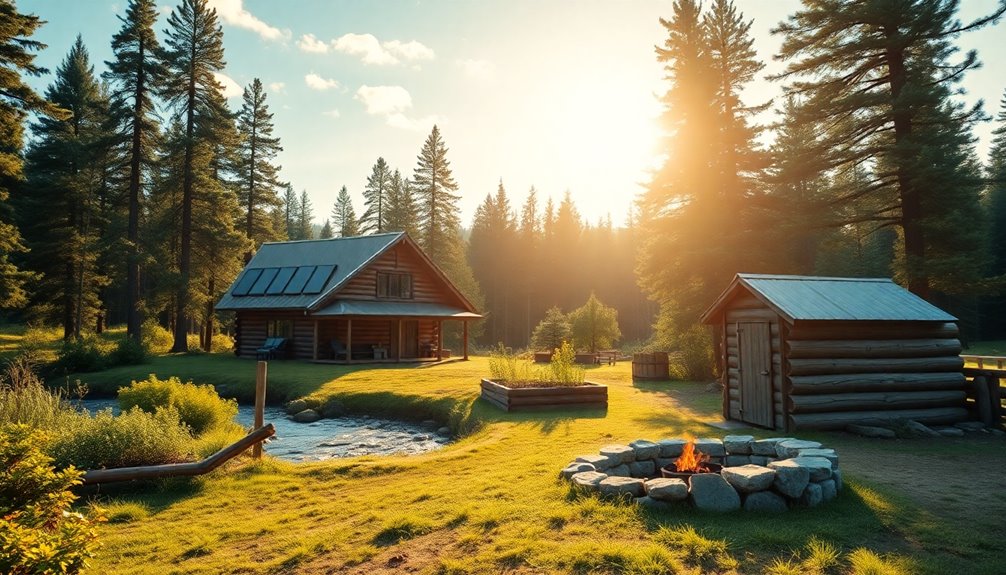
Your journey into off-grid living can be greatly enriched by tapping into a variety of resources designed to enhance your skills and knowledge.
Start by exploring recommended literature on sustainable practices like permaculture and organic farming; these offer detailed instructions that can refine your techniques.
Online forums and communities are invaluable for practical advice and shared experiences from fellow off-gridders.
Subscribing to magazines focused on homesteading will keep you updated on trends and innovations.
Attend workshops or local meetups to gain hands-on experience in essential skills like renewable energy installation or food preservation.
Finally, invest in comprehensive survival guides that cover emergency preparedness, shelter building, and resource management to ensure you're prepared for any situation. Additionally, consider learning about Leave No Trace principles to promote eco-friendly practices while living off the grid.
Frequently Asked Questions
How Do I Choose the Right Location for Off-Grid Living?
Choosing the right location for off-grid living involves considering factors like climate, access to natural resources, and proximity to essential services.
You'll want to find a spot with plenty of sunlight for solar power and a reliable water source.
Research local regulations and land prices to ensure it fits your budget.
Pay attention to the terrain and potential for natural disasters, too.
Ultimately, it should align with your lifestyle and survival needs.
What Legal Considerations Should I Be Aware Of?
When considering legal aspects, you'll want to research zoning laws in your chosen area.
Check for building codes, land use regulations, and any permits required for your intended structures.
Be aware of water rights and waste management regulations, too.
Local ordinances may affect your ability to live off-grid, so talk with local authorities to clarify requirements.
Ignoring these legalities can lead to complications down the line, so it's best to stay informed.
How Can I Maintain Communication While Off-Grid?
To maintain communication while off-grid, you can use satellite phones or two-way radios. These devices don't rely on traditional networks, ensuring you stay connected.
You might also consider setting up a ham radio for broader reach and emergency communication. Establishing a backup plan for messages, like using coded signals or pre-arranged meeting spots, can be helpful too.
Always have extra batteries and charge your devices whenever possible to ensure reliability.
What Are the Best Practices for Off-Grid Gardening?
When you're off-grid gardening, it's essential to focus on soil health, crop rotation, and natural pest control.
Start by enriching your soil with compost and organic matter. Use companion planting to deter pests and promote growth.
Water your plants efficiently, preferably using rainwater collection techniques.
Mulching helps retain moisture and suppress weeds.
Lastly, keep a garden journal to track what works best in your unique environment and adjust your practices accordingly.
How Do I Deal With Wildlife Threats?
When dealing with wildlife threats, it's crucial to stay proactive.
Start by securing your food sources in sturdy containers. Use fencing to protect your garden, and consider motion-activated lights or noise devices to deter animals.
Always clean up leftovers and avoid leaving pet food outside.
If you notice persistent wildlife, research local species and their habits to find effective deterrents.

